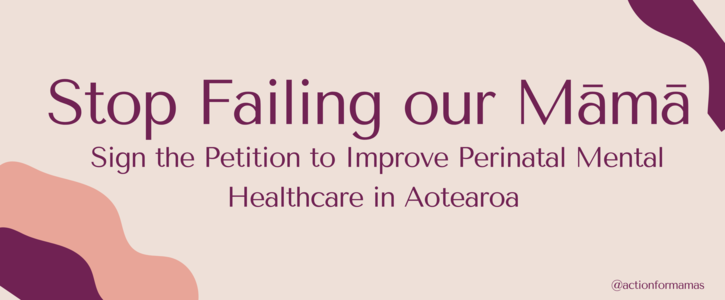1,000 signatures reached
To: Minister of Health Simeon Brown, Minister for Mental Health Matt Doocey, Health New Zealand – Te Whatu Ora, Members of the Health Committee
Stop Failing our Māmā: Improve Perinatal Mental Health Services in Aotearoa

This petition calls for the New Zealand Government to urgently reform perinatal mental health services and fund the establishment of mother and baby units to better support māmā experiencing acute postpartum mental illness.
Call to Action: We urge the New Zealand Government to:
- Implement reforms to the Mental Health Act to ensure that provisions are in place to ensure that women in the perinatal period receive appropriate treatment, and are treated with dignity and respect.
- Fund mother and baby units that are accessible to postpartum women who are experiencing acute mental illness that requires inpatient treatment
- Address the unique needs of pregnant and postpartum women within mental health services, ensuring that care is gender-sensitive and trauma-informed.
Why is this important?
With the repealing and replacing of the Mental Health Act currently taking place, now is the time to get this important issue in front of decision makers to ensure provisions are in place in the new legislation to ensure better outcomes for mothers who suffer from a perinatal mental illness.
⚠️ The Issues:
⚠️ The Issues:
- Capability of perinatal mental health services. Currently, there is a significant shortage of resources, leading to a reactive, crisis-driven approach where individuals often only receive help when they are in urgent need, much like an 'ambulance at the bottom of the cliff' response. This results in many not getting the proactive and voluntary care they require until it's too late, and thus results in compulsory treatment orders, or worst case scenario, tragic outcomes.
- Lack of Specialised Care: Current mental health services are insufficiently equipped to support postpartum women, particularly in general psychiatric wards that fail to address the specific needs of mothers.
- Trauma of Separation: The separation of mothers from their newborn babies during such a vulnerable time is profoundly damaging to both the mother and the child, exacerbating mental health struggles and hindering recovery.
- Need for Accessible Mother and Baby Units: There is an urgent need for mother and baby units that are accessible to all women (including in the regional areas) that would allow mothers experiencing postpartum mental illness to receive the care they need while remaining with their infants, promoting healing and the vital mother-child bond.
💬 Why is this issue important to me?
In 2022, after a complicated pregnancy and birth, I unfortunately developed an acute postpartum mental illness. Despite seeking help voluntarily (which included a declined referral to Maternal Mental Health whilst pregnant, requests for support while becoming unwell in hospital postpartum, and two subsequent visits to the Emergency Department where I was sent home), I was eventually sectioned under the Mental Health Act (1992), and separated from my son just three weeks postpartum. I was placed in the general psychiatric ward in Tauranga, a space that was terrifying, unsafe, and not suitable for a new mother experiencing a postpartum mental illness and recovering from childbirth.
The experience left me traumatised, with symptoms of PTSD and severe depression for the first two years of my son’s life. Through my advocacy, I’ve since learned that many others have faced similar trauma due to systemic gaps in perinatal mental healthcare. The lack of specialised support has long-lasting impacts, not only on the mother and baby, but also fathers, and the wider whānau.
In 2023, around the time of my son’s first birthday, I wrote to the hospital and public health services to genuinely engage about the issues I faced and suggest areas for improvement. My concerns were dismissed. This led to a decline in my mental health and forced me to step back.
But in 2024, I read about the Mental Health Bill (the legislative reform of our Mental Health Act) in the Mental Health Foundation’s newsletter – and decided that this was the right time to speak out, while the issue was on the agenda for decision-makers. I made a written submission on the Mental Health Bill in December 2024, and delivered an oral submission to the Health Committee in February 2025.
In May, I started an advocacy page on Instagram called @actionformamas. This is where I raise awareness and share content to help break the stigma of perinatal mental illness, including postpartum psychosis, which is a terrifying yet highly treatable perinatal mental illness that carries a lot of stigma and shame. This illness is what I experienced after the birth of my son.
✅ The Solutions
- Provide proactive, compassionate, culturally appropriate, and specialist care for women who experience severe perinatal mental illness
- Prevent traumatic separations, supporting recovery and bonding between māmā and pēpi
- Ensure appropriate and sufficient services are in place to improve mental health outcomes for whānau across Aotearoa
By improving perinatal mental health services and funding dedicated mother and baby units, we can ensure that no mother is forced to endure the traumatic separation from their newborn or face inadequate care in a general psychiatric ward. This is essential for the well-being of both mothers and their babies, and it is a necessary step in improving mental health care for all New Zealanders.
✍️ Add your name to support this change. Together, we can stop the trauma and start healing. No māmā should be left behind.
